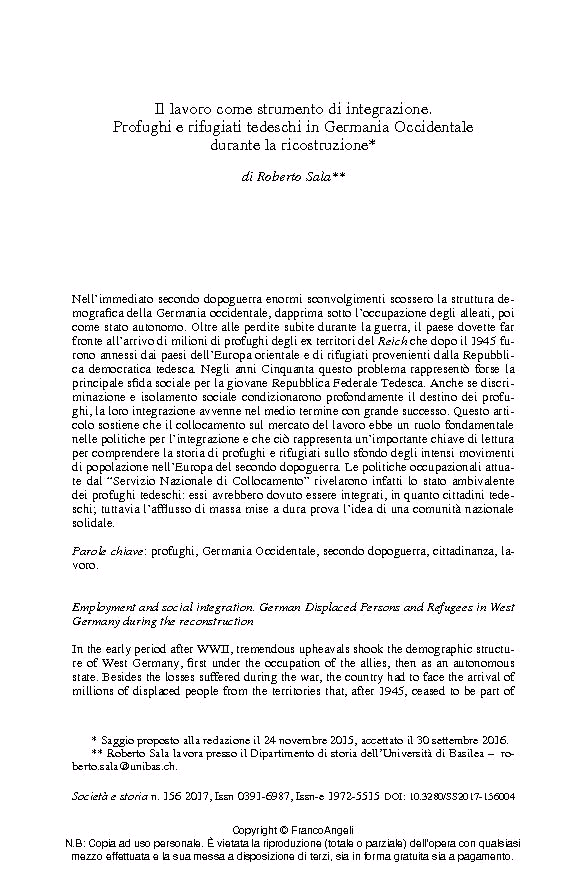Il lavoro come strumento di integrazione : profughi e rifugiati tedeschi in Germania Occidentale durante la ricostruzione
321-342 p.
Nell'immediato secondo dopoguerra enormi sconvolgimenti scossero la struttura demografica della Germania occidentale, dapprima sotto l'occupazione degli alleati, poi come stato autonomo. Oltre alle perdite subite durante la guerra, il paese dovette far fronte all'arrivo di milioni di profughi degli ex territori del Reich che dopo il 1945 furono annessi dai paesi dell'Europa orientale e di rifugiati provenienti dalla Repubblica democratica tedesca. Negli anni Cinquanta questo problema rappresentò forse la principale sfida sociale per la giovane Repubblica Federale Tedesca. Anche se discriminazione e isolamento sociale condizionarono profondamente il destino dei profughi, la loro integrazione avvenne nel medio termine con grande successo.
Questo articolo sostiene che il collocamento sul mercato del lavoro ebbe un ruolo fondamentale nelle politiche per l'integrazione e che ciò rappresenta un'importante chiave di lettura per comprendere la storia di profughi e rifugiati sullo sfondo degli intensi movimenti di popolazione nell'Europa del secondo dopoguerra. Le politiche occupazionali attuate dal "Servizio Nazionale di Collocamento" rivelarono infatti lo stato ambivalente dei profughi tedeschi: essi avrebbero dovuto essere integrati, in quanto cittadini tedeschi; tuttavia l'afflusso di massa mise a dura prova l'idea di una comunità nazionale solidale. [Testo dell'editore].
In the early period after WWII, tremendous upheavals shook the demographic structure of West Germany, first under the occupation of the allies, then as an autonomous state. Besides the losses suffered during the war, the country had to face the arrival of millions of displaced people from the territories that, after 1945, ceased to be part of Germany, and of the refugees from the German Democratic Republic. In the 1950s, this issue represented perhaps the main social challenge of the young Federal Republic. Although discrimination and social isolation deeply influenced the displaced persons' standing, their integration was successful in the long run. This article argues that their placement on the labour market played a major role within policies.
This is an important key to understand the history of the displaced people and refugees against the background of the intense population movement in post-war Europe. Through the history of the the National Employment Service, one may see that employment policies revealed the ambivalent status of German displaced people and refugees. On the one hand, they had to be integrated as they were citizens of the Federal Republic. On the other, the enormous problems resulting from mass immigration deeply challenged the idea of a national community. [Publisher's Text].
Ist Teil von
Società e storia : 156, 2, 2017-
Artikel aus derselben Ausgabe (einzeln erhältlich)
-
Informationen
ISSN: 1972-5515
KEYWORDS
- Profughi, Germania Occidentale, secondo dopoguerra, cittadinanza, lavoro
- Refugees, West Germany, post-WWII period, citizenship, employment



